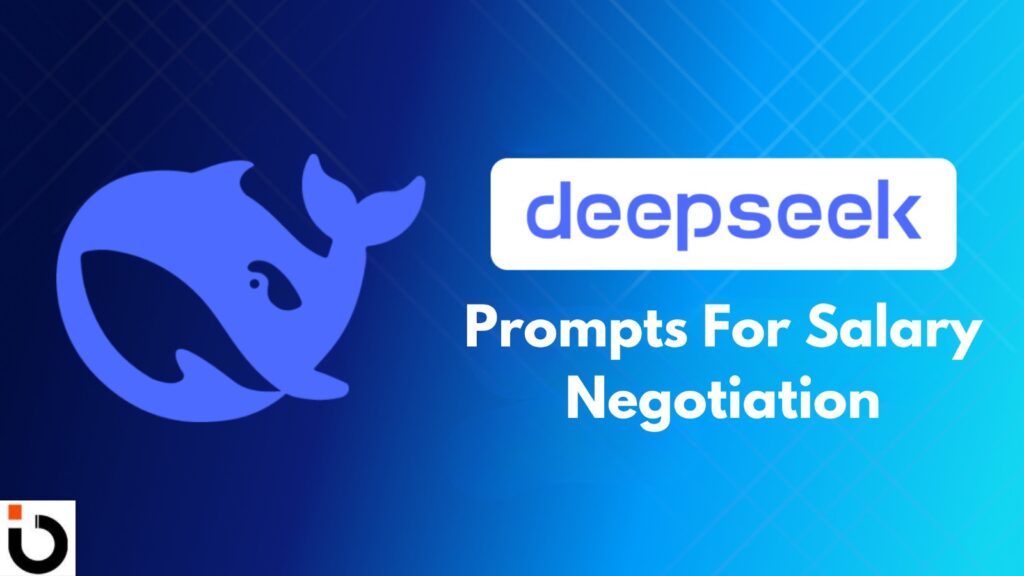Salary negotiation is one of the most critical—yet nerve-wracking—steps in the job search process. Whether you’re starting a new role, seeking a promotion, or transitioning careers, advocating for fair compensation can feel daunting. But what if you had an AI-powered ally to guide you? Enter DeepSeek Prompts for Salary Negotiation, a toolkit designed to help you craft persuasive, data-backed strategies to secure the salary you deserve.
In this blog, you’ll learn how to leverage AI-driven prompts to navigate salary discussions confidently. From researching market rates to responding to counteroffers, we’ll cover actionable tips to ensure you’re prepared for every stage of the negotiation process.
Table of Contents
ToggleWhy Salary Negotiaion Matters More Than You Think
Did you know that 60% of professionals admit they don’t negotiate their salaries—even though doing so can increase lifetime earnings by over $1 million? Accepting the first offer without discussion leaves money on the table and can impact future raises, bonuses, and retirement contributions.
Common mistakes that hold people back include:
Fear of seeming “greedy” or losing the job offer.
Lack of preparation (e.g., not researching industry standards).
Uncertainty about how to articulate their value.
This is where DeepSeek Prompts shines. By combining AI-generated strategies with real-world negotiation tactics, you’ll turn anxiety into empowerment. Let’s dive in.
Step 1: Research and Prepare with Data-Backed Insights
Before entering any negotiation, knowledge is power. Use DeepSeek Prompts to gather critical information about salary ranges, company benchmarks, and your unique value proposition.
DeepSeek Prompt Examples:
“Generate a list of salary benchmarks for a [Job Title] in [City/Industry] with [X Years] of experience.”
“What are the top 5 factors influencing salaries in [Industry] right now?”
“How do I calculate my total compensation package, including bonuses and benefits?”
Pro Tips:
Use platforms like Glassdoor, Payscale, and LinkedIn Salary to cross-reference AI-generated data.
Factor in cost of living, remote work flexibility, and industry trends (e.g., high demand for AI skills in tech).
Step 2: Craft Your Initial Salary Request
Your opening number sets the tone for the negotiation. Aim too low, and you’ll undervalue yourself; aim too high, and you risk alienating the employer. DeepSeek helps you strike the perfect balance.
DeepSeek Prompt Examples:
“Write a script to request a salary range from a recruiter politely.”
Example: “Could you share the budgeted range for this role? I want to ensure we’re aligned before moving forward.”
“Help me phrase my salary expectations based on my experience in [Field] and [Specific Achievements].”
Example: “Given my 5 years of leading cross-functional teams and increasing sales by 30% annually, I’m seeking a base salary between XandXandY.”
Pro Tips:
Always provide a range (not a single number) to keep the conversation flexible.
Anchor high but realistic—start at the top 10–15% of market rates.
Step 3: Respond to Counteroffers Like a Pro
Employers often counter with a lower number or non-monetary perks. Prepare rebuttals that keep the dialogue open while reinforcing your value.
DeepSeek Prompt Examples:
“Generate responses if the employer says, ‘We can’t meet your salary request due to budget constraints.’”
Example: “I understand budget limitations. Could we explore a performance-based bonus or revisit compensation in 6 months after demonstrating impact?”
“How to negotiate additional benefits (e.g., remote work, stock options) if the salary isn’t flexible?”
Pro Tips:
Focus on total compensation: Health insurance, signing bonuses, professional development funds, and equity can add significant value.
Use phrases like “I’m excited about this opportunity, and I’m confident we can find a mutually beneficial solution.”
Step 4: Handle Objections with Confidence
Employers may push back with objections like “Your current salary is lower than this offer” or “We don’t negotiate entry-level roles.” DeepSeek equips you with diplomatic, firm responses.
DeepSeek Prompt Examples:
“Help me address the question: ‘What’s your current salary?’ without disclosing it.”
Example: “I prefer to focus on the value I’ll bring to this role. Based on my research, competitive compensation for this position is in the range of XtoXtoY.”
“Write a response if told, ‘We don’t negotiate salaries for this level.’”
Example: “I appreciate the offer. However, given my specialized skills in [Area], I believe a adjustment to $Z would reflect the market rate and my expertise.”
Pro Tips:
Redirect the conversation to your future contributions, not past earnings.
Stay calm and avoid ultimatums unless you’re prepared to walk away.
Step 5: Close the Deal (or Know When to Walk Away)
Once you’ve reached an agreement, ensure all terms are documented. If the offer still falls short, DeepSeek can help you decline gracefully while preserving relationships.
DeepSeek Prompt Examples:
“Draft an email to accept an offer while confirming the agreed-upon terms.”
Example: “Thank you for accommodating my requests. I’m thrilled to accept the role at $X base salary with [Additional Benefits]. Please let me know next steps.”
“Write a polite rejection email if the offer doesn’t meet my requirements.”
Example: “While I’m grateful for the offer, I’ve decided to pursue opportunities that align more closely with my compensation goals. I hope we can stay connected.”
Pro Tips:
Request a written offer letter detailing salary, benefits, and timelines.
Express gratitude regardless of the outcome—professionalism leaves doors open.
Final Tips for Salary Negotiation Success
Practice Out Loud: Use DeepSeek’s dialogue prompts to rehearse with a friend or mentor.
Stay Solution-Focused: Frame requests as collaborations, not demands.
Leverage Timing: Negotiate after receiving an offer but before signing the contract—when your leverage is highest.
Conclusion: Empower Your Earnings with AI
Salary negotiation isn’t about “winning”—it’s about ensuring your compensation reflects your skills, experience, and market value. With DeepSeek Prompts, you’ll eliminate guesswork, reduce stress, and approach conversations with clarity and confidence.
Ready to take the leap? Start using these AI-driven strategies today, and turn your next salary discussion into a career-defining win.
Pro Tip: Bookmark this guide and revisit it before your next performance review or job offer!
FAQs: Mastering Salary Negotiation with DeepSeek Prompts
1. How can DeepSeek Prompts help me negotiate a higher salary?
DeepSeek Prompts provide AI-generated scripts, data-backed salary benchmarks, and strategic responses to common negotiation scenarios. By inputting details like your job title, experience, and industry, you’ll receive tailored advice to articulate your value, counter lowball offers, and negotiate benefits—all while reducing stress and guesswork.
2. Is it risky to negotiate my salary? Could the employer rescind the offer?
Most employers expect candidates to negotiate, and doing so professionally rarely leads to revoked offers. Use DeepSeek’s prompts to frame requests collaboratively (e.g., “I’m excited about this role and would like to discuss aligning the compensation with market standards”). Avoid ultimatums, and focus on mutual benefit.
3. What if I don’t know the market rate for my role?
DeepSeek Prompts can generate salary benchmarks based on your location, industry, and experience. Pair this with research on platforms like Glassdoor or Payscale. For example, ask: “What’s the average salary for a project manager in Austin with 5 years of experience?”
4. How do I respond if the employer asks for my current salary?
Politely redirect the conversation to your target salary. Use DeepSeek prompts like: “Help me avoid disclosing my current salary while emphasizing my desired range.” Example response: “I’m focused on ensuring this role aligns with my skills and the market rate, which I believe is between XandXandY.”
5. Can I negotiate salary for an entry-level or remote role?
Absolutely! Even entry-level roles have flexibility, especially if you have internships or certifications. For remote jobs, highlight cost savings for the employer (e.g., no relocation). Use prompts like: “Generate negotiation points for a remote marketing associate role.”
6. What if the employer says they ‘don’t negotiate salaries’?
Stay calm and pivot to non-monetary perks. Ask DeepSeek: “How to negotiate benefits if salary isn’t flexible?” Example: “Could we discuss additional vacation days or a performance review in 6 months?”
7. How do I handle a counteroffer without sounding confrontational?
Use collaborative language. DeepSeek can generate responses like: “I appreciate the offer. To make this work, could we explore a signing bonus or adjust the equity share?” Always tie requests to your enthusiasm for the role.
8. Should I negotiate over email or in person?
For initial discussions, email allows time to craft thoughtful responses using DeepSeek’s scripts. For final negotiations, a live call shows confidence. Use prompts like: “Draft a follow-up email after a verbal offer.”
9. What if I’m negotiating a promotion, not a new job?
The same principles apply! Use DeepSeek to list achievements and market data. Example prompt: “Generate talking points to justify a raise during a performance review.” Highlight metrics like revenue growth or efficiency improvements.
10. How do I know if I should accept the offer or walk away?
Set a “walk-away number” based on your research and financial needs. If the offer falls short and the employer won’t budge, DeepSeek can help you decline gracefully while keeping the door open for future opportunities.
11. Are there industries where salary negotiation is less common?
While negotiation is widespread in tech, finance, and consulting, it’s becoming more common across sectors like healthcare and education. Use DeepSeek to tailor your approach: “How to negotiate salary in non-profit roles?”
12. Can I negotiate benefits like remote work or flexible hours?
Yes! Benefits are often easier to negotiate than salary. Ask DeepSeek: “How to request a 4-day workweek or professional development stipend?” Example: “Given the hybrid work model, could we formalize my remote work arrangement?”
13. How important is it to get the final offer in writing?
Critical. Always request a written offer letter detailing salary, benefits, and timelines. Use DeepSeek prompts like: “Draft an email to confirm the agreed terms before accepting.”
14. What if I’m bad at negotiating? Can AI really help?
DeepSeek Prompts act as a “cheat code” for negotiation newbies. The AI provides scripts, data, and phrasing to build confidence. Practice with prompts like: “Simulate a salary negotiation conversation for a software engineer.”
15. How soon after a job offer should I start negotiating?
Ideally, within 24–48 hours of receiving the offer. Use DeepSeek to draft a prompt reply: “Write a thank-you email after the offer and request time to discuss details.”
Final Tip: Bookmark this FAQ section and revisit it alongside the blog for a stress-free negotiation strategy. With DeepSeek, you’re not just asking for more money—you’re advocating for your worth. 💼✨






